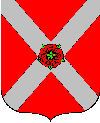 to Bios Page
to Bios Page to
Family Page
to
Family Page to
Peerage Page
to
Peerage Page to Home Page
to Home PageSir Anthony NEVILLE
Born
: ABT 1492, South Leverton, Nottinghamshire, EnglandDied
: 1557Father: Alexander NEVILLE
Mother
: Dorothy EYREMarried
1: Maria ZOUCHE ABT 1519 Children:2. George NEVILLE
Married
2: Elizabeth ZOUCHEMarried
3: Anne BOROUGH AFT 31 Jan 1542The details in this biography come from the History of Parliament, a biographical dictionary of Members of the House of Commons.
J.p. Notts 1538-d. q.1554, midland circuit 1540; Kntd. 11 May 1544; commr. musters, Notts. 1539, chantries, Notts. and Derbys. 1548, relief, Notts. 1550, goods of churches and fraternities 1553; other commissions 1535-d.; esquire of the body by 1539; member, council in the north Feb. 1550-d., sheriff. Notts. and Derbys. 1552-3.
Anthony Neville’s parentage has not been established, although it is clear that he belonged to the family settled at South Leverton and thus counted among his forbears Thomas Neville, recorder of Nottingham and Member for that town in 1472. He may have been the son of Alexander Neville, escheator of Nottinghamshire and Derbyshire in 1519-20, and the brother of Richard Neville whose elder son Thomas became dean of Canterbury and younger son Alexander secretary to Archbishops Parker, Grindal and Whitgift.
A lawyer by training, Neville was counsel to George Talbot, 4th Earl of Shrewsbury, whose will he was to witness (and may have prepared) in Aug 1537. During the rebellion of the previous year he had been paymaster to the earl’s retinue and when Shrewsbury was made responsible for defending Derby he used his ‘friend’ Neville to report to the King and to bear back the royal orders. Another patron was Cranmer, himself a Nottinghamshire man, who judged Neville a man ‘of right good wisdom, experience and discretion’ and recommended him to Cromwell in 1537 for the office of custos rotulorum. (It was, however, a namesake who was Cranmer’s steward.) To his role in local government, especially in a judicial capacity, and his place at court, Neville added military duty in the north; in 1544 he was made surveyor general of victuals for the Earl of Hertford’s campaign and was one of those knighted at Leith.
In 1539 he had been granted the dissolved priory of Mattersey, not far from South Leverton, and the manor of Mattersey and neighbouring properties. It must have been shortly afterwards that he made a prestigious marriage to the widowed daughter of Thomas Borough, 3rd Lord Burgh and so acquired a connexion with a future Queen in Catherine Parr, while he was closely associated with such leading local figures as Sir John Markham and John Hercy.
His service under Hertford probably contributed to Neville’s election as knight of the shire in the Parliament of 1545, when his fellow-Member was Hertford’s brother-in-law Michael Stanhope, but he was in other respects well qualified for the seat. Neville was not to be elected again, but as sheriff in 1552-3 he returned the knights for Nottinghamshire and Derbyshire to Edward VI’s second Parliament and Mary’s first. His choice as sheriff in 1552, and his earlier appointment to the council in the north, imply that he stood well with the Duke of Northumberland, but he probably shared the temporizing attitude of Francis Talbot, 5th Earl of Shrewsbury, the president of the council, and he was to be retained on the bench under Mary.
Neville’s qualities were recognized by William Phillipot, a rich merchant and one of Newark’s greatest benefactors, who appointed him supervisor of his will, ‘to the intent that my said executors may the better and more be assisted by his good counsel in and about all my causes’; he and Phillipot were also among the executors of Thomas Magnus, archdeacon of the East Riding, who left his estate to charity.
His marriage with Anne Borough made Neville the uncle of Richard Topcliffe, who became his ward, but there is no reason to believe that Topcliffe’s hatred of Catholics owed anything to the relationship. Neville’s own resort to litigation was not to be compared with the legal battle in which his widow and elder son were to engage after his death. When he died on 3 Sep 1557 he possessed lands in Mattersey, Rampton and Thorpe valued at £41 a year, the manor of South Leverton worth £10, and scattered properties in Nottinghamshire valued at £5 13s. By his will, dated eight days earlier, he bequeathed to his younger son George his lease of Laxton parsonage and certain lands and tenements, and gave all his servants a quarter’s wages and subsistence until they found new employment. The heir Alexander was 19 years old when his father died.
Sources:
Black, C. J.: https://www.historyofparliamentonline.org/volume/1509-1558/member/neville-sir-anthony-1508-57
 to Bios Page
to Bios Page |
 to
Family Page to
Family Page |
 to
Peerage Page to
Peerage Page |
 to Home Page
to Home Page |